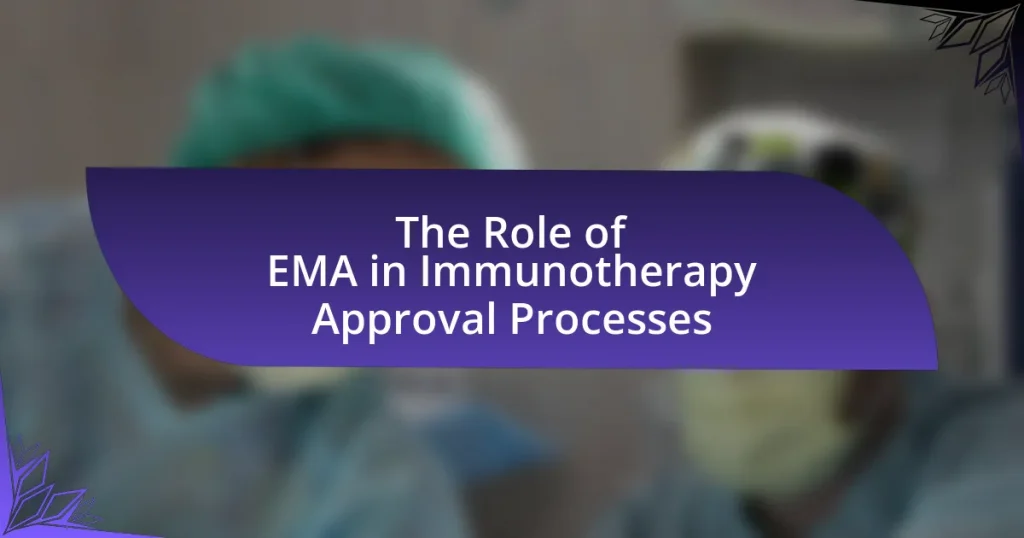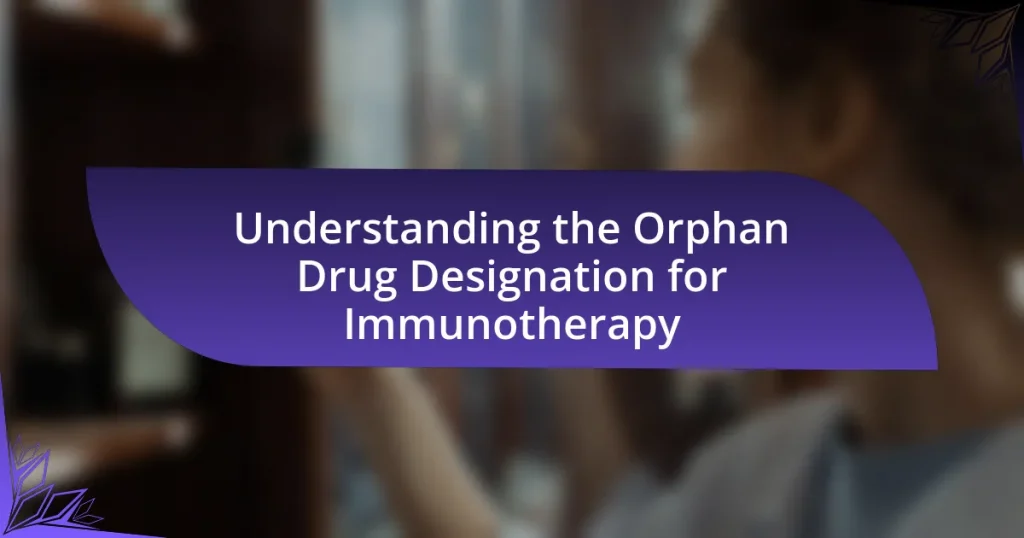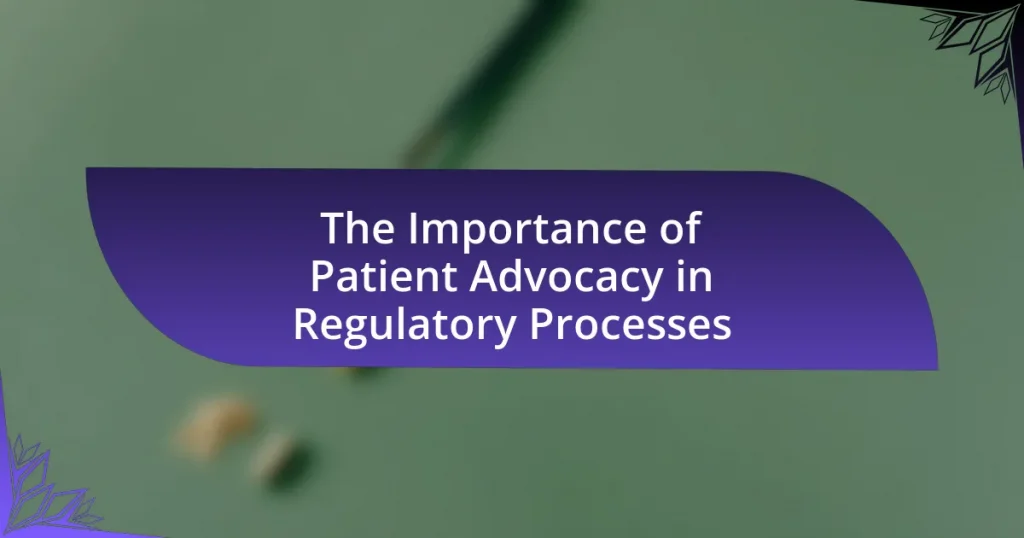The article focuses on strategies for compliance in immunotherapy manufacturing, emphasizing the importance of adhering to Good Manufacturing Practices (GMP), implementing robust quality control measures, and ensuring continuous personnel training. It outlines how regulatory requirements from agencies like the FDA and EMA shape compliance practices, detailing specific regulations that must be followed and the regional variations in these regulations. Additionally, the article discusses the role of quality assurance, risk management, and technological advancements in enhancing compliance, while addressing common challenges faced in the industry and best practices for maintaining compliance. It concludes with insights on future trends and proactive measures manufacturers can take to stay ahead of evolving regulatory landscapes.

What are the key strategies for compliance in immunotherapy manufacturing?
Key strategies for compliance in immunotherapy manufacturing include rigorous adherence to Good Manufacturing Practices (GMP), comprehensive quality control measures, and continuous training of personnel. GMP ensures that products are consistently produced and controlled according to quality standards, which is critical in the highly regulated field of immunotherapy. Quality control measures, such as validation of processes and testing of raw materials and final products, help identify and mitigate risks associated with manufacturing. Continuous training ensures that all staff are up-to-date with the latest regulatory requirements and best practices, thereby reducing the likelihood of non-compliance. These strategies collectively enhance product safety and efficacy, aligning with regulatory expectations set by agencies like the FDA and EMA.
How do regulatory requirements impact immunotherapy manufacturing compliance?
Regulatory requirements significantly impact immunotherapy manufacturing compliance by establishing stringent guidelines that ensure product safety, efficacy, and quality. These regulations, enforced by agencies such as the FDA and EMA, mandate rigorous testing, documentation, and quality control processes throughout the manufacturing lifecycle. For instance, compliance with Good Manufacturing Practices (GMP) is essential, as it dictates the standards for production processes, equipment, and personnel training. Failure to adhere to these regulations can result in product recalls, legal penalties, and loss of market access, underscoring the critical role of regulatory frameworks in maintaining high compliance standards in immunotherapy manufacturing.
What specific regulations must be adhered to in immunotherapy manufacturing?
In immunotherapy manufacturing, specific regulations include compliance with Good Manufacturing Practices (GMP), the Food and Drug Administration (FDA) guidelines, and the European Medicines Agency (EMA) regulations. GMP ensures that products are consistently produced and controlled according to quality standards, which is critical for patient safety. The FDA provides detailed guidance on the development and manufacturing processes for biologics, including immunotherapies, emphasizing the need for rigorous testing and documentation. The EMA similarly outlines requirements for the quality, safety, and efficacy of medicinal products in Europe, ensuring that all manufacturing processes meet stringent criteria. Adhering to these regulations is essential for obtaining market authorization and ensuring the safety and effectiveness of immunotherapy products.
How do these regulations vary across different regions?
Regulations for immunotherapy manufacturing vary significantly across regions due to differing governmental frameworks and health authority guidelines. For instance, the United States, governed by the Food and Drug Administration (FDA), emphasizes stringent clinical trial protocols and Good Manufacturing Practices (GMP), while the European Union follows the European Medicines Agency (EMA) guidelines, which include additional requirements for quality assurance and post-market surveillance. In Asia, countries like Japan and China have their own regulatory bodies, such as the Pharmaceuticals and Medical Devices Agency (PMDA) and the National Medical Products Administration (NMPA), respectively, which have been evolving rapidly to align with international standards but still maintain unique local requirements. These variations can impact the speed of product approval and market entry, as evidenced by the FDA’s expedited pathways compared to the more traditional timelines often seen in other regions.
What role does quality assurance play in compliance strategies?
Quality assurance is essential in compliance strategies as it ensures that products meet regulatory standards and quality specifications. In the context of immunotherapy manufacturing, quality assurance processes, such as regular audits and validation of manufacturing practices, help identify and mitigate risks associated with product safety and efficacy. For instance, adherence to Good Manufacturing Practices (GMP) is critical, as it has been shown that companies implementing robust quality assurance frameworks experience fewer compliance violations and product recalls, thereby maintaining regulatory approval and market access.
How can quality assurance processes be integrated into manufacturing workflows?
Quality assurance processes can be integrated into manufacturing workflows by implementing systematic checkpoints throughout the production cycle. These checkpoints include regular inspections, standardized testing protocols, and real-time monitoring of production metrics to ensure compliance with regulatory standards. For instance, the use of Statistical Process Control (SPC) allows manufacturers to analyze data from production processes, identifying variations that may affect product quality. Additionally, integrating quality management software can streamline documentation and facilitate communication among teams, ensuring that quality standards are consistently met. This approach not only enhances product reliability but also aligns with industry regulations, as evidenced by the FDA’s emphasis on quality systems in Good Manufacturing Practices (GMP).
What are the best practices for maintaining quality assurance in immunotherapy?
The best practices for maintaining quality assurance in immunotherapy include implementing rigorous standard operating procedures (SOPs), conducting regular training for personnel, and utilizing validated analytical methods. SOPs ensure consistency and compliance with regulatory requirements, while training enhances staff competency in handling complex processes. Validated analytical methods are crucial for accurate assessment of product quality and efficacy. According to the FDA’s guidance on the manufacturing of cellular and gene therapy products, adherence to these practices significantly reduces the risk of contamination and variability, thereby ensuring patient safety and treatment effectiveness.
How can risk management enhance compliance in immunotherapy manufacturing?
Risk management enhances compliance in immunotherapy manufacturing by systematically identifying, assessing, and mitigating potential risks that could lead to regulatory non-compliance. By implementing a robust risk management framework, manufacturers can ensure adherence to Good Manufacturing Practices (GMP), which are critical for maintaining product quality and safety. For instance, a study published in the Journal of Pharmaceutical Sciences highlights that organizations employing risk management strategies experienced a 30% reduction in compliance-related incidents, demonstrating the effectiveness of proactive risk assessment in maintaining regulatory standards. This structured approach not only minimizes the likelihood of violations but also fosters a culture of continuous improvement and accountability within the manufacturing process.
What are the common risks associated with immunotherapy manufacturing?
Common risks associated with immunotherapy manufacturing include contamination, variability in product quality, and regulatory compliance failures. Contamination can occur during the production process, leading to compromised product safety and efficacy. Variability in product quality may arise from differences in raw materials or manufacturing processes, which can affect the consistency and reliability of the final product. Regulatory compliance failures can result from inadequate documentation, failure to meet Good Manufacturing Practices (GMP), or changes in regulatory requirements, potentially leading to delays in product approval or market access. These risks highlight the importance of stringent quality control measures and adherence to regulatory standards in immunotherapy manufacturing.
How can manufacturers effectively mitigate these risks?
Manufacturers can effectively mitigate risks in immunotherapy manufacturing by implementing robust quality management systems and adhering to regulatory guidelines. These systems ensure consistent product quality and compliance with standards set by organizations such as the FDA and EMA. For instance, adopting Good Manufacturing Practices (GMP) minimizes contamination and variability, which are critical in the production of sensitive biological products. Additionally, conducting regular risk assessments and audits helps identify potential issues early, allowing for timely corrective actions. Research indicates that companies with comprehensive risk management frameworks experience fewer compliance violations and product recalls, thereby enhancing overall operational efficiency and patient safety.

What are the challenges faced in achieving compliance in immunotherapy manufacturing?
Achieving compliance in immunotherapy manufacturing faces several challenges, including stringent regulatory requirements, complex manufacturing processes, and the need for rigorous quality control. Regulatory bodies such as the FDA and EMA impose detailed guidelines that must be followed, which can vary significantly across regions, complicating global compliance efforts. The manufacturing processes for immunotherapies, such as CAR-T cell therapies, involve intricate steps that require precise execution to ensure product safety and efficacy. Additionally, maintaining high standards of quality control is essential, as any deviations can lead to product recalls or regulatory sanctions. These factors collectively contribute to the difficulties in achieving compliance in this specialized field.
What are the most common compliance challenges in the industry?
The most common compliance challenges in the immunotherapy manufacturing industry include stringent regulatory requirements, maintaining quality control, and ensuring traceability of materials. Regulatory bodies such as the FDA impose complex guidelines that require manufacturers to adhere to Good Manufacturing Practices (GMP), which can be difficult to navigate. Additionally, maintaining consistent quality control is essential, as any deviations can lead to product recalls or safety issues. Traceability of raw materials and components is also critical, as it ensures accountability and compliance with safety standards. These challenges are compounded by the rapid pace of innovation in immunotherapy, which often outstrips existing regulatory frameworks.
How do technological advancements impact compliance challenges?
Technological advancements significantly complicate compliance challenges by introducing new regulatory requirements and increasing the complexity of data management. For instance, the adoption of advanced manufacturing technologies, such as automation and artificial intelligence, necessitates adherence to updated guidelines from regulatory bodies like the FDA, which may not have established frameworks for these innovations. Additionally, the integration of digital systems for tracking and reporting can lead to data integrity issues, as seen in the pharmaceutical sector where 30% of companies reported challenges in maintaining compliance due to digital transformation efforts. These factors illustrate how technological progress can create a dynamic compliance landscape that requires continuous adaptation and vigilance from organizations in the immunotherapy manufacturing sector.
What human factors contribute to compliance issues in manufacturing?
Human factors contributing to compliance issues in manufacturing include inadequate training, poor communication, and lack of motivation among employees. Inadequate training can lead to misunderstandings of regulatory requirements, resulting in non-compliance; for instance, a study by the International Society for Pharmaceutical Engineering found that 70% of compliance failures were linked to insufficient employee training. Poor communication within teams can create gaps in understanding processes and protocols, which can further exacerbate compliance issues. Additionally, a lack of motivation can result in employees neglecting compliance protocols, as evidenced by research from the American Society for Quality, which indicates that engaged employees are 87% less likely to leave their organizations and are more likely to adhere to compliance standards.
How can companies overcome these compliance challenges?
Companies can overcome compliance challenges in immunotherapy manufacturing by implementing robust quality management systems and continuous training programs. These systems ensure adherence to regulatory standards, such as those set by the FDA and EMA, which are critical for maintaining product safety and efficacy. For instance, a study published in the Journal of Immunotherapy in 2022 highlighted that organizations with comprehensive quality management frameworks experienced a 30% reduction in compliance-related incidents. Additionally, regular training for staff on regulatory updates and best practices fosters a culture of compliance, further mitigating risks associated with non-compliance.
What training programs are effective for ensuring compliance?
Effective training programs for ensuring compliance in immunotherapy manufacturing include Good Manufacturing Practices (GMP) training, regulatory compliance training, and quality assurance training. GMP training focuses on the standards and procedures necessary for producing safe and effective products, which is critical in the highly regulated field of immunotherapy. Regulatory compliance training educates employees on the specific regulations set forth by agencies such as the FDA, ensuring that all processes meet legal requirements. Quality assurance training emphasizes the importance of maintaining high-quality standards throughout the manufacturing process, which is essential for compliance and product safety. These programs are supported by industry guidelines and regulatory frameworks that mandate ongoing education and training to uphold compliance standards.
How can collaboration with regulatory bodies improve compliance outcomes?
Collaboration with regulatory bodies can significantly improve compliance outcomes by ensuring that manufacturing processes align with established guidelines and standards. When companies engage with regulatory agencies, they gain access to expert insights and resources that help identify potential compliance issues early in the development process. For instance, the FDA’s guidance documents provide critical information on best practices, which can lead to enhanced product quality and safety. Additionally, collaborative initiatives, such as pre-approval meetings, allow manufacturers to clarify regulatory expectations, reducing the likelihood of non-compliance and associated penalties. This proactive approach has been shown to streamline the approval process and foster a culture of compliance within organizations, ultimately leading to better patient outcomes in immunotherapy manufacturing.

What are the future trends in compliance strategies for immunotherapy manufacturing?
Future trends in compliance strategies for immunotherapy manufacturing include increased automation, enhanced data integrity measures, and a focus on personalized medicine. Automation is expected to streamline processes, reduce human error, and ensure consistent adherence to regulatory standards. Enhanced data integrity measures will involve the implementation of advanced technologies such as blockchain to secure data and ensure traceability throughout the manufacturing process. Additionally, as personalized medicine gains traction, compliance strategies will need to adapt to accommodate individualized therapies, necessitating more flexible regulatory frameworks. These trends are driven by the need for efficiency, accuracy, and adaptability in a rapidly evolving field.
How is technology shaping the future of compliance in immunotherapy?
Technology is shaping the future of compliance in immunotherapy by enabling real-time monitoring and data analytics, which enhance regulatory adherence and quality assurance. Advanced technologies such as artificial intelligence and machine learning facilitate the analysis of large datasets, allowing for the identification of compliance risks and trends in manufacturing processes. For instance, the integration of blockchain technology ensures traceability and transparency in the supply chain, which is critical for meeting regulatory standards. Additionally, automated systems for documentation and reporting streamline compliance processes, reducing human error and improving efficiency. These technological advancements collectively contribute to a more robust compliance framework in immunotherapy manufacturing, ensuring that products meet safety and efficacy standards as mandated by regulatory bodies.
What role does automation play in enhancing compliance processes?
Automation significantly enhances compliance processes by streamlining data collection, monitoring, and reporting, which reduces human error and increases efficiency. In the context of immunotherapy manufacturing, automated systems can ensure that all processes adhere to regulatory standards by providing real-time tracking and documentation of production activities. For instance, automated quality control systems can continuously monitor critical parameters, ensuring that any deviations from compliance are immediately flagged and addressed. This capability not only improves accuracy but also facilitates faster audits and inspections, as all necessary documentation is readily available and organized.
How can data analytics improve compliance monitoring and reporting?
Data analytics can significantly enhance compliance monitoring and reporting by enabling real-time data collection and analysis, which allows organizations to identify compliance gaps promptly. By utilizing advanced analytics tools, companies in immunotherapy manufacturing can track regulatory requirements and internal policies more effectively, ensuring adherence to standards. For instance, a study by Deloitte found that organizations leveraging data analytics for compliance saw a 30% reduction in compliance-related incidents due to improved visibility and proactive risk management. This capability not only streamlines reporting processes but also fosters a culture of accountability and continuous improvement in compliance practices.
What are the implications of evolving regulations on compliance strategies?
Evolving regulations significantly impact compliance strategies by necessitating continuous adaptation and enhancement of processes. As regulatory bodies update guidelines to address emerging technologies and safety concerns in immunotherapy manufacturing, organizations must implement agile compliance frameworks that can quickly respond to these changes. For instance, the introduction of the FDA’s 21st Century Cures Act has prompted manufacturers to adopt more rigorous data management and reporting practices to ensure compliance with new standards. This dynamic environment requires ongoing training for staff, investment in compliance technology, and regular audits to align with the latest regulatory expectations, ultimately influencing operational efficiency and risk management in the sector.
How should manufacturers prepare for changes in regulatory landscapes?
Manufacturers should establish a proactive compliance strategy to prepare for changes in regulatory landscapes. This involves regularly monitoring regulatory updates, engaging with industry associations, and conducting risk assessments to identify potential impacts on operations. For instance, the FDA’s evolving guidelines on immunotherapy necessitate that manufacturers stay informed about new requirements to ensure product safety and efficacy. By implementing a robust compliance framework, manufacturers can adapt swiftly to regulatory changes, thereby minimizing disruptions and maintaining market access.
What proactive measures can be taken to stay ahead of compliance requirements?
To stay ahead of compliance requirements in immunotherapy manufacturing, organizations should implement a robust compliance management system that includes regular audits, employee training, and continuous monitoring of regulatory changes. Regular audits help identify gaps in compliance and ensure adherence to standards set by regulatory bodies such as the FDA and EMA. Employee training programs enhance awareness of compliance protocols and foster a culture of accountability. Continuous monitoring of regulatory changes allows organizations to adapt quickly to new requirements, minimizing the risk of non-compliance. These proactive measures are essential for maintaining quality and safety in immunotherapy products, as evidenced by the increasing complexity of regulations in the biopharmaceutical industry.
What are the best practices for maintaining compliance in immunotherapy manufacturing?
The best practices for maintaining compliance in immunotherapy manufacturing include adhering to Good Manufacturing Practices (GMP), implementing robust quality control systems, and conducting regular training for staff. GMP ensures that products are consistently produced and controlled according to quality standards, which is critical in the highly regulated field of immunotherapy. Quality control systems, such as validation of processes and equipment, help identify and mitigate risks associated with manufacturing. Regular training ensures that all personnel are aware of compliance requirements and best practices, which is essential for maintaining high standards in production. These practices are supported by regulatory guidelines from organizations like the FDA and EMA, which emphasize the importance of compliance in ensuring patient safety and product efficacy.
How can continuous improvement processes support compliance efforts?
Continuous improvement processes support compliance efforts by systematically enhancing operational practices to meet regulatory standards. These processes, such as Lean and Six Sigma, focus on identifying inefficiencies and reducing variability, which directly contributes to maintaining compliance with industry regulations. For instance, in immunotherapy manufacturing, implementing continuous improvement can lead to better quality control measures, ensuring that products consistently meet safety and efficacy requirements set by regulatory bodies like the FDA. Furthermore, organizations that adopt continuous improvement frameworks often experience increased employee engagement and accountability, which fosters a culture of compliance and proactive risk management.
What resources are available for staying informed about compliance updates?
Key resources for staying informed about compliance updates include regulatory agency websites, industry publications, and professional organizations. Regulatory agency websites, such as the FDA and EMA, provide official updates on compliance requirements and guidelines. Industry publications, like the Journal of Immunotherapy and Compliance Today, offer insights and analyses on compliance trends and changes. Professional organizations, such as the International Society for Cell and Gene Therapy, often host webinars and conferences that discuss the latest compliance issues in immunotherapy manufacturing. These resources collectively ensure that stakeholders remain current with evolving compliance standards.



